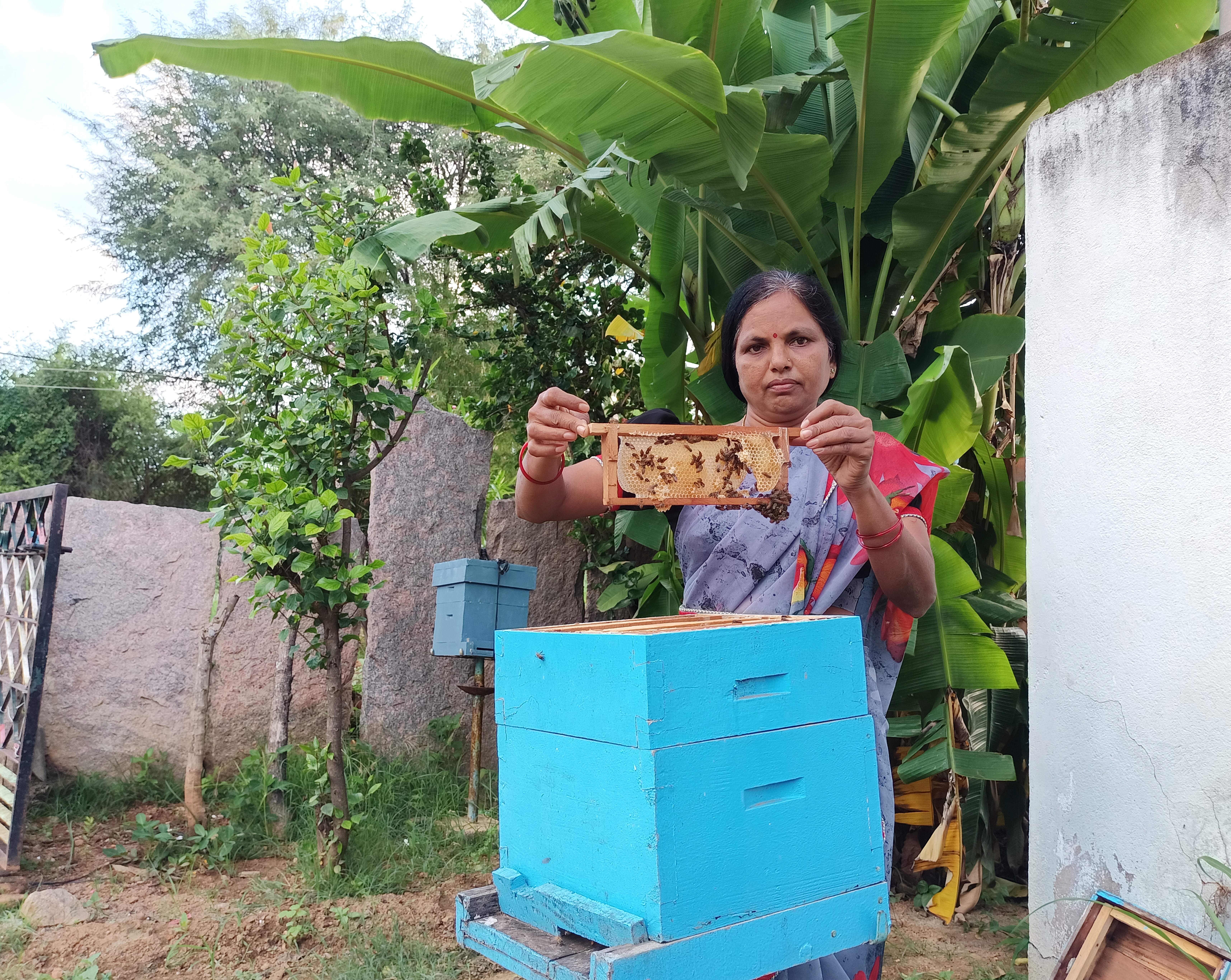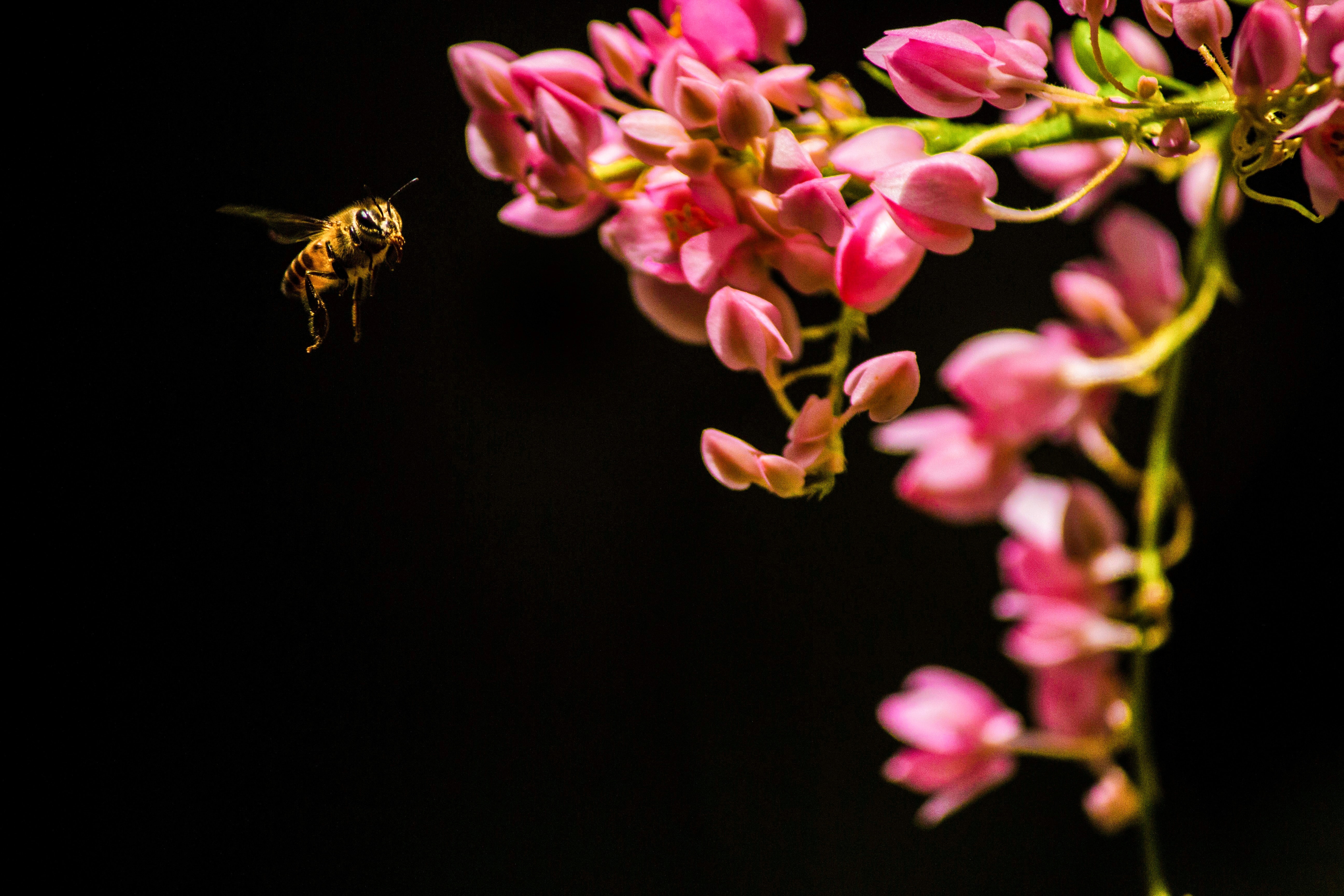Bee-Lady of the Honey-Hill
August 1, 2022

Savitramma, an avid apiarist and entrepreneur has built a sustainable honey business
Buzzing bees is what comes to Savitramma’s mind as she wakes up at the crack of dawn. The beekeeper-cum-entrepreneur starts the day checking on the beehives strewn around her house. As she calmly puts in her hand to retrieve some of the plates, the sun is beginning to shine on another promising day for the 50-year-old.
A trained beekeeper, Savitramma has been running a beekeeping unit on the premises of her house in Madhuguri, a town in Tumkur district in the state of Karnataka. The town gets its name from a nearby hillock - Madhu-Giri, which means honey-hill in Kannada.
“Bees are an essential part of nature. The honey that we extract is pure, and the process is scientific. There are no chemicals or preservatives added. This has been lab tested,” says Savitramma.

Bees help in crop production and increase output of food crops.
Bees are one of the most common pollinators, which means they pick up the pollen of flowers and spread it, that allows plants, including many food crops, to reproduce. Bees and other pollinators such as birds and bats affect 35 percent of the world's crop production, increasing outputs of 87 of the leading food crops worldwide, plus many plant-derived medicines.
However, the bee population has been on the decline globally in recent decades due to habitat loss, intensive farming practices, changes in weather patterns and the excessive use of agrochemicals such as pesticides. This, in turn, poses a threat to various plants critical to human well-being and livelihoods.
Savitramma rues this fact. “Beekeeping contributes positively towards nature and environment in more than one way as bees are an essential part of the ecosystem,” she says.
This was not always the case. In the past, she would have jumped out of her skin at seeing bees. And now, such is her expertise that she can easily identify the Queen Bee which, plays an important role in a hive.
Savitramma’s love affair with bees started when she stumbled upon an orientation session delivered at a local mela (exhibition) conducted in her Gram Panchayat, Dabbeghatta area, on beekeeping and how it can be developed into a successful business model.
Inspired by the discussions and the knowledge gained in the session, Savitramma grew hopeful of running her own business. After consultations with experts and her family, she borrowed INR 70,000 (~USD 870) from the Community Investment Fund (CIF) and used the funds to buy the necessary machinery and raw materials for rearing bees.
CIFs are grants provided to Self-Help Groups, under the National Rural Livelihood Mission (NRLM), for improving the quality of life, generating employment, and meeting other social needs of members.

Under the National Rural Economic Transformation Project, entrepreneurs like Savitramma are trained on important aspects of business operations.
Thus began her journey of running a small business. However even as she became an experienced beekeeper, she found herself lacking in marketing her products. Also, as honey is a food product, she realized that she needed to conform to various regulations if she had to expand her business beyond her small community.
Under the National Rural Economic Transformation Project being implemented by the State Government in partnership with the United Nations Development Programme (UNDP), Savitramma and many entrepreneurs like her were supported by training on important aspects of business operations, regulations, and creating market linkages.
Savitramma soon understood the importance of having a business plan, good packaging & design, and identifying customers beyond her town.
The market linkage support provided by the Project helped her build and diversify her customer base. She started participating in Trade Fairs and exhibitions, which resulted in big orders. A customer at an exhibition in Kerala placed the biggest order she has witnessed yet – a monthly requirement of 15 kgs!
The project team also supported Savitramma in getting an FSSAI licence for her enterprise. Obtaining an FSSAI (Food Safety and Standards Authority of India) license is mandatory before starting any food business operation in India.

Market linkage support provided by the Project helped Savitramma build and diversify her customer base
What started as an enterprise with four beehive boxes, has grown to twelve. The extraction of honey is done periodically under the supervision of representatives from the State Horticultural Department. They also help her prepare the unit for the next cycle of honey production.
She now supplies pure honey to more than 100 customers every month and 25 kgs of honey every quarter to various companies. Her income has tripled to INR 9000 (USD 112) per month.
“I find the practice of Apiculture very calming. I always wanted to contribute to my family’s income, and with beekeeping, I have been able to fulfil my dream,” says a proud Savitramma as she pulls out another plate of buzzing bees.

 Locations
Locations